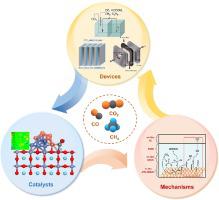EnergyChem ( IF 25.1 ) Pub Date : 2022-08-04 , DOI: 10.1016/j.enchem.2022.100086 Xin Wang , Ximeng Lv , Gengfeng Zheng , Yongzhu Fu

|
The continuous increase of greenhouse gases (CO2 or CH4) in the atmosphere has been imposing an imminent threat for global climate change and environmental hazards. Electrochemical one-carbon (C1) molecule conversion to value-added fuels and chemicals provides a green and efficient approach to mitigate fossil energy shortages and storing supernumerary renewable electricity in fuels, thereby reducing the global carbon footprint. Benefited from the substantial cost reduction of clean electricity, the room-temperature electrolysis has been emerging as a competitive strategy for C1 molecule unitization. In this review, we mainly focus on the state-of-the-art technologies involving electrocatalysts and devices, and introduce the representative works about room-temperature C1 molecule electrolysis in recent years, which will serve as a timely reference for catalyst design and device fabrication for efficient and practical conversion of C1 molecules. The challenges and perspectives are also discussed to suggest possible research directions toward fuel production from C1 molecules by room-temperature electrolysis in the future.
中文翻译:

室温电化学 C1 到燃料的转化:材料工程和设备设计的视角
温室气体(CO 2或 CH 4) 在大气中已经对全球气候变化和环境危害构成迫在眉睫的威胁。电化学单碳 (C1) 分子转化为增值燃料和化学品为缓解化石能源短缺和在燃料中储存多余的可再生电力提供了一种绿色有效的方法,从而减少了全球碳足迹。受益于清洁电力成本的大幅降低,室温电解已成为 C1 分子单元化的竞争策略。在这篇综述中,我们主要关注涉及电催化剂和器件的最新技术,并介绍近年来室温C1分子电解的代表性工作,这将为催化剂设计和设备制造提供及时的参考,以实现 C1 分子的高效和实用转化。还讨论了挑战和前景,以提出未来通过室温电解从 C1 分子生产燃料的可能研究方向。



























 京公网安备 11010802027423号
京公网安备 11010802027423号